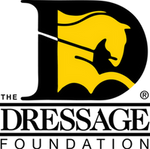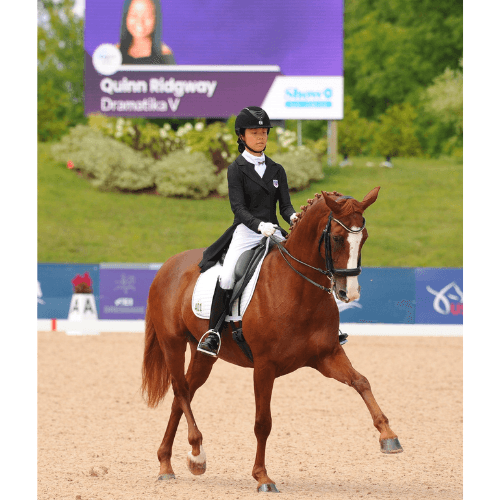
Quinn Ridgway credit Mark Donaldson
Day One at the CHIO Aachen:
Arriving at CHIO Aachen for the first time felt as though I stepped into an equestrian wonderland. I was immediately shocked by the stunning horses, the sheer scale, the immaculate arenas, the grand stadiums, and the flawless landscaping. It was surreal to have the opportunity to watch and learn from riders whom I've admired for years, from the warm-up all the way to the ring. It is truly a privilege to witness something so legendary!
In our discussions today, we talked about how the sport is evolving. Olympic bronze medalist Ali Brock said that people must be reasonable with the changes to try to prevent the pendulum from swinging too far in either direction. We must acknowledge that anything too drastic may lead to unforeseen effects.
The founder of Eurodressage, Astrid Appels, told us that riders often feel immense pressure—not just from owners, spectators, and clients, but also from their national federations—to deliver excellent results in competition. But ultimately, she stressed that riders must remain deeply self-aware and ensure that their ego does not influence their decision-making.
Dr. Johan Lenz, the Swedish team veterinarian, explained that there must be a greater focus on harmony, relaxation, and ethical training methods. More importantly, he emphasized the need to “seek better education for riders so their horses understand what they are being asked.” He mentioned research led by Andrew McClean, an Australian rider working to understand what the horse is capable of mentally and how they approach things. Lenz stated that research on how the equine brain functions is about 20 years behind that of dogs.
Markus Scharmann, Director of the Training Center in Warendorf, Germany, echoed the sentiments of Brock, Lenz, and Appels. As a training master at the center, he emphasized that we all must take responsibility and act in ways that prioritize animal welfare. In order to do this, riders need to approach riding with integrity and education, so they do not confuse the horse. He highlighted both his and Lenz's perspectives on approaching the changing climate with a powerful example: he randomly told us, “Stand up, sit down, stand up, sit down.” Naturally, we all sat there unsure of what to do. That demonstration gave me an even deeper sense of compassion and empathy for horses, whose kind nature allows them to try, even when they’re unsure of what’s being asked. He closed by explaining the necessity to recognize that horses are far more than just competitors. They are teachers—partners who help us grow and learn in ways that would be impossible without them.
After speaking individually with this fantastic group of professionals across the equine industry, it was encouraging to hear all of them have a similar thought process: the horse first, because we all started out with horses because we simply loved them. Riders must remain true to themselves and prevent outside pressures from changing their perspective. To combat this disruption in the sport, it is becoming clear that we must self-reflect on riders' education, their training system, and how that impacts their overall approach to training. As Scharmann states most accurately, we must once again see horses as more than a machine to win, but rather as an opportunity to learn from them, to develop and evolve both as individuals and as a whole sport.
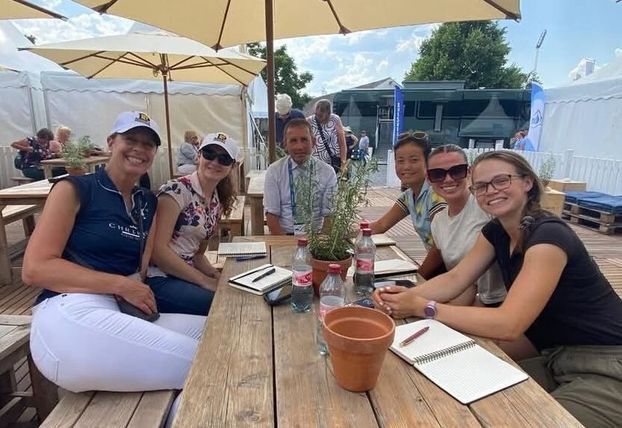
Meeting with Markus Scharmann, Head of the German National Training Center
Day Two:
Today we had the incredible opportunity to watch the CDI 5*. It was truly a lesson in witnessing top riders experience both the highest highs and the lowest lows—the reality of equestrian sport. It was also remarkable to observe the entire process, from the first steps in the warm-up ring to riding down centerline in the massive stadium.
Some of my personal favorite combinations included the queen of dressage, Isabell Werth and Wendy de Fontaine; Becky Moody and Jagerbomb; Justin Verboomen and Zonik Plus; and Kasey Perry-Glass and Heartbeat. They were nothing short of inspiring.
In addition, we had the chance to engage in meaningful conversations with Laura Roberts and Christine Traurig.
Laura Roberts, Director of Dressage at USEF, emphasized the importance of synergy between coaches, judges, Chefs d’Equipe, and other stakeholders, pointing out that while everyone has a different role, we all share the same goal—ensuring the continued success and sustainability of dressage. Regular meetings and open dialogue, she suggested, could help address the challenges currently facing our sport.
Christine Traurig, U.S. Team Coach and Chef d’Équipe, began our conversation by reflecting on her early realization that unconditional love for the horse wasn’t enough. She needed to educate herself further to be clearer and fairer to the horse. She stressed that knowledge must be paired with common sense and feel. In her view, classical dressage ideals and training scale are essential because once you understand those principles, riding becomes logical.
She placed strong emphasis on the foundation of the training scale, particularly maintaining appropriate tempo, contact, suppleness, and relaxation. Every step in training builds on the one before, and riders must not compromise these fundamentals. Riders expect the best from their horses, so it is only fair that horses expect the best from their riders. It is the rider’s responsibility to guide the horse step-by-step, always with fairness and clarity.
Our conversation with Traurig tied in beautifully with the themes we had just discussed with Roberts. Traurig emphasized that everyone involved in the sport must promote good riding and be brave enough to admit that training will never be perfect. That’s the reality of horse training—or any kind of training. Anyone who’s tried to learn something new knows that the process includes uncertainty, mistakes, progress, and triumph. These moments are not inherently bad—they’re an essential part of growth.
However, as Traurig pointed out, following the classical methods and the training scale helps minimize confusion for the horse. Like Roberts, she highlighted the need for unity among all participants in the sport.
It was truly fascinating to hear from two leaders in the industry and to explore their perspectives on so many topics. Across the board, our speakers echoed a common message: In the pursuit of excellence, we must emphasize ethical training based on classical theory, stay committed to building understanding between horse and rider, find common ground within the sport, and support and reward training that upholds the welfare of the horse.
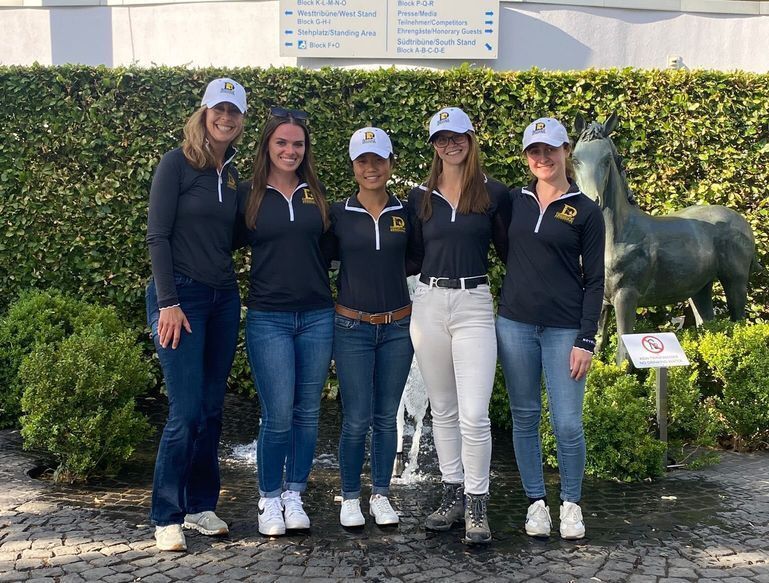
Thank you, Novella Equestrian, for donating these fantastic shirts!
Day Three:
Today, we had the fantastic opportunity to watch both the warm-up and the competition. The warm-up was incredibly interesting, as I was able to observe each rider’s approach to preparing their horse for the show ring. The CDI 4* rides were nearly impeccable—truly inspiring, to say the least. It’s always a good reminder to see that even top professionals face the same challenges we do. I also was genuinely blown away watching the FEI Juniors compete. The quality of both the horses and the riders was outstanding.
In addition to being thoroughly impressed by the rides, we were able to speak with several remarkable individuals. They were all extremely generous with their time, knowledgeable, and successful within the industry.
Throughout our discussions, a common theme emerged: communication.
Tinne Vilhelmson, a seven-time Swedish Dressage Olympian, spoke about how much dressage has changed over the years—from the quality of horses to the riding, and the overall climate of the sport. She stressed that due to the evolving atmosphere, everyone involved has a responsibility to highlight the best parts of the discipline.
Caroline Darcourt, a rider at Lövsta Stuteri, echoed the idea that the sport should focus on the harmony between horse and rider. Both Vilhelmson and Darcourt emphasized the need for better communication among all involved: judges, riders, trainers, coaches, and more.
Becky Moody, a Great Britain Team Rider, exuded excitement as she shared her personal story. She credited her upbringing for giving her valuable experience and emphasized the importance of continuous learning. Speaking about judging, she expressed empathy for judges, noting they are in an “immensely challenging position” as custodians of the sport. Moody also suggested that people should share the fact that horses love their work, much like working dogs do, to change the way the public views equine sports.
Michael Klimke, owner and head trainer at Turnierstall, stressed the importance of prioritizing the relationship with the horse. He encouraged riders to focus more on training than showing and to stay hungry for knowledge. He remarked that “young people in Germany are not as hungry as they once were,” noting a decline in riding schools. Klimke emphasized that riders must know the when, how, and why before they can ask a horse for something—a sentiment that echoed many others who stressed the importance of theoretical understanding.
Janet Foy, an FEI 5* judge, shared that when giving top marks (9s or 10s), she looks for the feeling that she could easily ride the horse herself—yet acknowledged that “feeling is subjective.” We briefly touched on AI and technological advancements. Foy noted that while fully relying on AI would “take away the art of the sport,” it could still be a helpful tool for riders to self-correct. Foy concluded with a compelling idea already in place: the Rider’s International Club—an invitation-only gathering where riders, judges, and others could meet to discuss scoring, rules, and more. This, I believe, represents just one of many potential solutions worth exploring.
Margaret Duprey, an incredibly generous TDF donor and sponsor of international riders, stressed that communication is the key to success. After today, it is clear that countless respected voices in the industry agree about the importance of communication.
I end today with this question: How can we, as participants in the sport, help create change? Is it more meetings like the Rider’s International Club? More widespread education for all involved? Or something entirely new and unimagined?
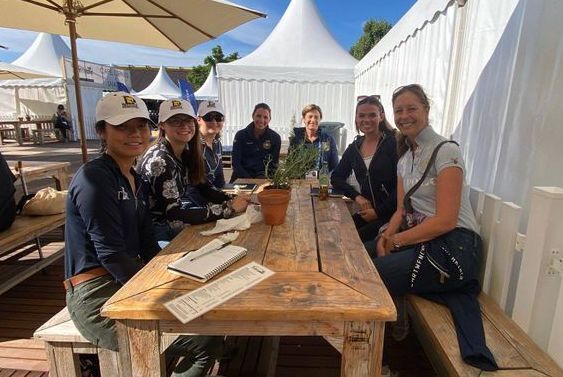
Meeting with Swedish Team Member, Tinne Vilhelmson-Silfvén
Day Four:
Today we watched the CDI 4* GP Freestyle, CDI 1*, CDI 5* GP Special, and the CDIJ Freestyle. It is incredible to see the outstanding quality of horses that are over in Europe! It is exciting to think of the extremely bright futures all of these horses have. I cannot wait to continue to follow their success with their excellent riders.
Between watching rides, we had the opportunity to speak with US Team Rider, Kasey Perry-Glass, and Dutch Team rider, Dinja van Liere. They were both very generous with their time and knowledge and we very much appreciate them taking time from their busy schedule to chat with us!
Kasey Perry-Glass began the discussion by opening up about the challenges she has faced within the sport. She explained that “if she only knew then what she knows now,” she would have felt more confident in trusting her gut and training. She stressed the importance of surrounding yourself with healthy people who give you confidence from the ground. Perry-Glass noted that of course “you don’t want everyone around you to tell you how amazing you are, but rather you want your support team to keep you feeling empowered to go in the ring and ride with confidence."
We continued the conversation discussing how the sport was changing and the current atmosphere. Perry-Glass had a remarkably optimistic perspective on the topic as she explained that she felt that at Aachen, things seem to be going in a more positive direction, and she believes that it will be a trend. And while she believes things are going in the right direction, she stated that it is still the rider’s job to try and be better and make it better, in terms of their riding and continuing to learn. Perry-Glass, with a visit from Ali Brock, closed by exclaiming that our one takeaway from watching the fantastic rides should be, “Don’t be boring! Ride forward!!”
Later in the day, we got to speak with one of my favorite riders, Dinja van Liere, an Olympic Dutch Team rider. Liere started off discussing her perspective on young horse training. She explained that she does everything in a playful manner with a young horse, with the mindset that everything is easy and soft. Nothing that is too challenging or difficult. Liere used the example of walk/trot transitions. She stated that she uses the walk to trot transitions on a young horse to build muscle and give them an understanding of the half halt. In other words, always be thinking of the future and how the training you are putting on the young horse will affect them later in life. She also stressed that reactions to the aids are one of the most important aspects of her training.
Liere additionally echoed many of our previous speakers by emphasizing the importance of understanding technique–why you do something, why something doesn’t work, how to do it, etc. Similar to Perry-Glass, we furthered the conversation by addressing how the sport is changing. Like Perry-Glass, Liere felt as though the sport was moving in a positive direction and took on a more upbeat mindset. She stated that the FEI is doing more than we are aware of, is working to change, and felt as though people were stepping up to make that change.
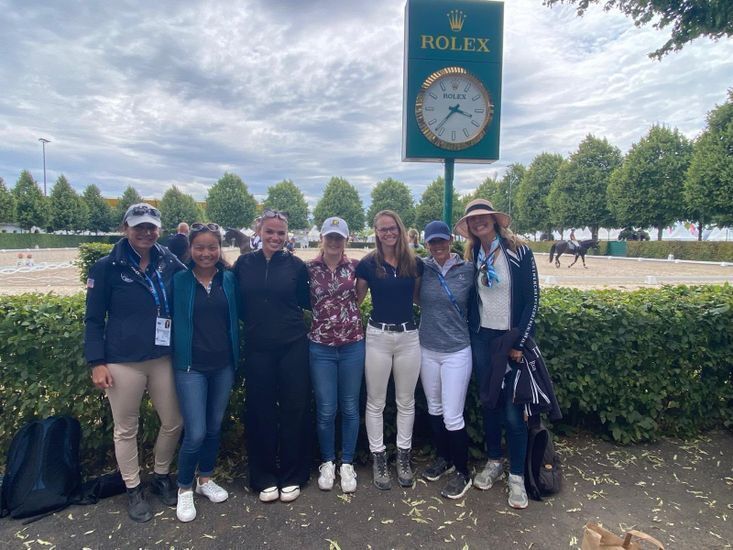
With U.S. Olympians, Ali Brock and Kasey-Perry Glass
Day Five:
Today was our final day here in Aachen and it ended on quite an exciting note with the CDI 5* Grand Prix Freestyles. To say the environment was electric was an understatement. It is unlike anything I have ever experienced – from clapping and cheering everyone on their last centerline to watching countless inspiring combinations. We additionally had the opportunity to speak with Marcus Orlob (U.S. Olympian), Hubertus Schmidt (Owner and Trainer at Fleyenhof in Germany), Ingrid Klimke (German Team Rider), and George Williams (Past President of USDF and USEF Youth Coach). They were all incredibly generous with their time and their knowledge.
Marcus Orlob discussed how he feels that the sport is moving in a positive direction, as he echoed numerous other speakers who said that they saw only really amazing riding at Aachen.
Hubertus Schmidt opened the conversation by explaining the need to make and keep a horse sensitive as it is one of the crucial elements for a harmonious picture. He also emphasized that when training, the rider is always making compromises as “there is never one straight journey" to reach your goals. Schmidt closed our discussion by stressing a common theme – the importance of focusing on the basics and maintaining the ability to gymnasticize the horse.
Ingrid Klimke, famously known for riding perfect tempis without stirrups in the schooling area, reminded us of the importance of always listening to your horse. Even having been to the Olympics numerous times, Klimke explained that there are simply some days when she is unable to stick to her plan as the horse simply does not feel up to it. This crucial mindset avoids potentially putting the horse and rider in a compromised place.
Klimke acknowledged the fact that there are always going to be critics, but that it is important not to hide. Klimke cited a moment at Aachen where she wanted to ride indoors due to the very large crowd watching the warm up. However, she quickly changed her thinking, explaining that people should be able to see that riders face challenges and imperfections, but that there is an ethical way to solve them.
George Williams discussed the crucial role that judges play in the sport. Not only do they influence how riders present and train their horses, they also influence the types of horses being bred. Williams left us with this thought: during times that the sport is under a microscope, it is vital to remain united to the same goal and keep horse welfare at the forefront.
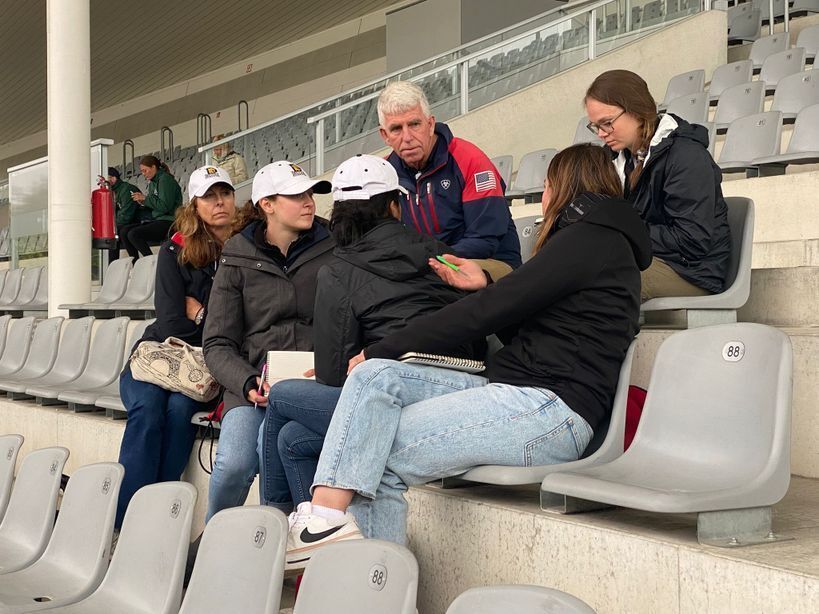
Learning from George Williams
Quinn's Wrap-Up:
Impactful Lessons:
- Stay true to yourself, your training, and your values–Move through your journey with honesty and integrity. Continue to always strive to be a better rider, trainer, horseman, and advocate for your horse.
- Understand the basics and the techniques.
- Dinja van Liere explained that she continues to go back to the coach she initially trained with, as he challenged her to not only find the feeling, but to also understand the why, the how, the when, etc.
- Michael Klimke similarly discussed that riders must stay hungry for theoretical knowledge.
- Christine Traurig stressed the value of the training scale and when you understand that, it is logical and methodical. It is only fair to the horse if the rider is clear with their aids which goes back to the rider’s understanding, not the horse’s.
- Find the team of people who empower you to feel confident in your training.
- Prioritizing the horse, communication and unity with everyone involved, ethical training, better education for riders, and rewarding harmony not tension are going to be important factors in paving a path for the sport to continue.
Coming to Aachen was such a privilege and an opportunity to know what is truly possible. Listening to top professionals in the industry has shown me that everyone goes through their own unique journey, but we all start in the same way: with an unconditional love of the horse and our sport. And I believe that if nothing else, that is something that we can unite upon.
I leave Aachen with a new dressage family, feeling encouraged, inspired, and ready to apply all I have learned – not just in practice but in how I carry myself, how I approach new challenges or disappointments, and how I continue to grow as a horseman and rider.
Huge thanks to The Dressage Foundation, Margaret Duprey and all donors, and everyone who made this journey possible — we are truly grateful! A special thank you to JJ Tate and Richard Malmgren for being incredible chaperones, from navigating the chaos of the Madrid airport to organizing inspiring speakers to guiding thoughtful discussions. And to my fellow Dream Participants — it was a pleasure getting to know you. I can’t wait to reconnect and continue sharing this journey together! This trip wouldn’t have been the same without any of you!
